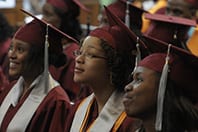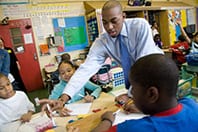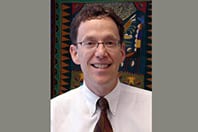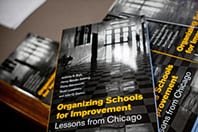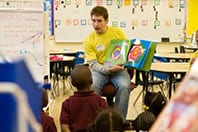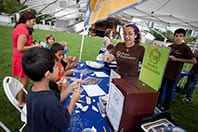Commitment to Urban Education
University Charter School Graduates First High School Class
The University of Chicago Charter School (UCCS) awarded diplomas to its first graduating class in June at Rockefeller Memorial Chapel. Ninety-eight percent of the 51 graduates were accepted to colleges, compared with approximately half of all Chicago Public Schools students, and the UCCS students’ scholarship awards totaled $1.5 million. “What began as just a plan on paper has now become a living reality for our students and their families,” said Victoria Woodley, director of academic and social supports at the UCCS Woodlawn campus. “It is one thing to have a dream, it is quite another to be able to say that we can prepare urban youth for college and beyond. We can say that now.”
New Funding Will Support, Create Urban Education Initiatives
The University received another $5 million gift from the Lewis-Sebring Family Foundation to support the University’s groundbreaking work to improve urban schooling in Chicago and across the country. The centerpiece of these efforts is the University’s Urban Education Institute. The new gift brings to nearly $15 million the foundation’s investment in the University’s education work.
Building upon six years of successful urban teacher preparation, the University of Chicago Urban Teacher Education Program will refine and expand its teacher preparation efforts with the assistance of nearly $11.6 million from the U.S. Department of Education’s Office of Innovation and Improvement through its Teacher Quality Partnership Grants Program.
Anne and Kenneth Griffin donated $10 million to fund a multiyear initiative to identify programs and strategies for improving student education in America’s schools. The Griffin Foundation contribution, made through the University of Chicago and Harvard University, will partner the world’s preeminent education scholars with teachers, parents, and students in an innovative, metrics-based program.
Nineteen Grads Join Teach For America
Nineteen members of the Class of 2009 joined Teach For America this year, making the University of Chicago one of the largest contributors to the program among schools its size. With just 4,100 corps members selected from 35,000 applicants to this year’s program, UChicago students stood out from the competition. “We look for demonstrated past leadership and achievement, perseverance in the face of challenges, strong critical thinking skills, and respect for students and families in low-income communities,” said Teach For America’s Lorraine Anderson.
Foundation Leader Heads Education Research Unit
Paul Goren, senior vice president of Chicago’s Spencer Foundation and a national leader in the education foundation community, was selected to lead the Consortium on Chicago School Research, which has become a national model for research on urban public school systems. Goren has spent the past 25 years at the intersection of education research, policy, and practice. He began his career as a middle school teacher and later trained as an education policy analyst and school administrator. In his new position, Goren serves as the Lewis-Sebring Director of the Consortium, which is part of the University’s Urban Education Institute.
Consortium Identifies Solutions for Chicago Public Schools
A landmark study by current and former researchers with the Consortium on Chicago School Research (CCSR) found five key factors which, when working together, have proven to boost student achievement. The study led to a new book, Organizing Schools for Improvement: Lessons from Chicago.
A report by CCSR shows that 8 in 10 Chicago Public Schools (CPS) students displaced by school closings transferred to schools that rank in the bottom half of the CPS system on standardized tests. Because most displaced students transferred from one low-performing school to another, the move did not, on average, significantly affect student achievement.
Freshman year course performance—more than such background characteristics as race, gender, socioeconomic status, or prior achievement—predicts which students with disabilities are most at risk for dropping out of high school, according to a report coauthored by CCSR.
A CCSR study found that the Chicago Public Schools College-Prep-for-All Policy that dramatically increased science requirements did not help students learn more science and actually may have hurt their college prospects.
CCSR released nearly 100 individualized school reports that reveal which Chicago public high schools have made progress toward getting freshmen on track to graduate. The customized reports analyze how freshmen at each school performed on crucial academic measures and how that performance has changed over time. The reports allow educators to identify those students most at risk of dropping out and to evaluate whether past intervention efforts have been successful.
A pilot evaluation system in Chicago would grade teachers on a much tougher curve, according to a CCSR policy brief. The Excellence in Teaching Project is the proposed replacement for a 30-year-old CPS checklist under which nearly all teachers received one of the two highest rankings, rendering the system virtually meaningless.
Meeting Looks to Make Innovations Stick
The Center for Elementary Mathematics and Science Education (CEMSE) hosted “Sustaining Change in Education: Finding Shared Language and Common Ground,” a meeting focused on how to make lasting change in the literature of education, health, marketing, business, and economics. Funded by the National Science Foundation, the project is part of the larger cross-disciplinary open research initiative Researchers Without Borders, which aims to engage the ultimate recipients of findings in a collaborative process, so innovations take root.
Hundreds of First-Years Volunteer at Local Schools
Over 500 incoming first-years participated in Engage Chicago Through Service Day, sponsored by the University Community Service Center. They spent one day after Orientation Week doing service projects throughout the neighborhoods surrounding the University. This year, almost one-third of the participating organizations were local schools. UChicago students worked directly with elementary and high school students, in both public and private schools, to conduct recess, serve food, talk about getting into college, and participate in the children’s normal school day.
Economists Examine How to Assess and Shape School Reform
Prominent scholars from across the nation gathered at the Milton Friedman Institute for Research in Economics in June to examine how economists can help assess and shape school reform. At the conference, “Economic Analysis and Education Policy,” scholars discussed how best to use assessment information in systems that determine pay, tenure status, and job assignments for educators; examined the effects of vouchers and charter schools in a variety of settings; and examined how accountability systems can affect the efficient use of public resources in education.
White House Honors Project Exploration for Science Mentoring
University paleontologist Paul Sereno and Gabrielle Lyon, AB’94, AM’94, accepted a Presidential Award for Excellence in Science Mentoring on behalf of Project Exploration at a White House ceremony. Sereno and Lyon co-founded the nonprofit program in 1999 to make science accessible to the public—particularly minority youth and girls—through personalized experiences with science and scientists. “There is no higher calling than furthering the educational advancement of our nation’s young people and encouraging and inspiring our next generation of leaders,” said President Obama in announcing the award. Project Exploration is among 22 recipients of the award, which includes $10,000 to further advance their work.
